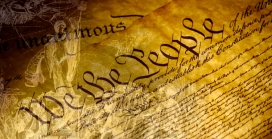 We live in a representative democratic society that evolved from the rise of constitutional republics like France and America in the late 18th Century. This resulted in the emergence of modern constitutions governing the legal behaviour of political leaders, supported by accounting frameworks for citizenship. Governments now manage taxation, legal process and border controls by issuing identity documentation, but as we spend more time online our real world identity overlaps our emerging digital identity and vice versa leading to governments becoming “digital by default” as citizen identity documentation is transformed into data. This process is useful for navigating the digital realm but it lacks democratic accountability, creating a shift in representation from government to private enterprise where information is easily shared without consent, enabling misrepresentation and fraud.
We live in a representative democratic society that evolved from the rise of constitutional republics like France and America in the late 18th Century. This resulted in the emergence of modern constitutions governing the legal behaviour of political leaders, supported by accounting frameworks for citizenship. Governments now manage taxation, legal process and border controls by issuing identity documentation, but as we spend more time online our real world identity overlaps our emerging digital identity and vice versa leading to governments becoming “digital by default” as citizen identity documentation is transformed into data. This process is useful for navigating the digital realm but it lacks democratic accountability, creating a shift in representation from government to private enterprise where information is easily shared without consent, enabling misrepresentation and fraud.
 In response to these challenges the UK government attempted the digitisation of state processes with a National Identity Register, holding fifty categories of information on every British citizen, but this was scrapped in 2010 over human rights and security concerns. More recently at the 2011 e-G8 summit, President Sarkozy of France and Eric Schmidt of Google argued ‘who could best build the networked society’: big government or the corporations? Ben Hammersley, in his British Council lecture then argued ‘that we are moving to networked societies, but we do not yet know how to build them’. Meanwhile global online communities continue to evolve regardless, with over 900 million users signed up to Facebook actively transacting personal data from identity accounts designed to optimise corporate advertising revenues.
In response to these challenges the UK government attempted the digitisation of state processes with a National Identity Register, holding fifty categories of information on every British citizen, but this was scrapped in 2010 over human rights and security concerns. More recently at the 2011 e-G8 summit, President Sarkozy of France and Eric Schmidt of Google argued ‘who could best build the networked society’: big government or the corporations? Ben Hammersley, in his British Council lecture then argued ‘that we are moving to networked societies, but we do not yet know how to build them’. Meanwhile global online communities continue to evolve regardless, with over 900 million users signed up to Facebook actively transacting personal data from identity accounts designed to optimise corporate advertising revenues.
 Citizens, who nominally hand over their collective power to the state at election time, now need more control of how their identity is represented as both governments and corporations make decisions on our behalf; data protection law needs to be extended to the intellectual property rights of the digital self. Governments could begin translating passports, driving licenses and birth certificates into online citizen accounts that embrace human rights, by granting appropriate charters for citizens’ to represent themselves digitally. ‘True Identity’ accounts, a form of digital passport, could then provide a unique master key for authenticating digital transactions with utilities, banks and social networks, without handing over data to second or third party providers.
Citizens, who nominally hand over their collective power to the state at election time, now need more control of how their identity is represented as both governments and corporations make decisions on our behalf; data protection law needs to be extended to the intellectual property rights of the digital self. Governments could begin translating passports, driving licenses and birth certificates into online citizen accounts that embrace human rights, by granting appropriate charters for citizens’ to represent themselves digitally. ‘True Identity’ accounts, a form of digital passport, could then provide a unique master key for authenticating digital transactions with utilities, banks and social networks, without handing over data to second or third party providers.
 Online citizen accounts, chartered by government for identity creates opportunities for an alternative peer2peer economy network to emerge for transacting money, including layers of banking, savings and loans. A financial network without the expensive costs imposed by service providers, only using money issued by government, guaranteed by users through identity accounts. This would enable all currency to be invested back into the social environmental economy to create a robust utility focused solely on the needs of the community that it served. From these social citizen-centric themes the trust required to transform hierarchical representative democracy into a participatory network society could evolve along side an internetwork of citizen banks.
Online citizen accounts, chartered by government for identity creates opportunities for an alternative peer2peer economy network to emerge for transacting money, including layers of banking, savings and loans. A financial network without the expensive costs imposed by service providers, only using money issued by government, guaranteed by users through identity accounts. This would enable all currency to be invested back into the social environmental economy to create a robust utility focused solely on the needs of the community that it served. From these social citizen-centric themes the trust required to transform hierarchical representative democracy into a participatory network society could evolve along side an internetwork of citizen banks.
Written and Published by Oliver Ashton and Fred Garnett
@oliverashton – @fredgarnett
oliver@oliverashton.com
http://transactioneconomy.wordpress.com/